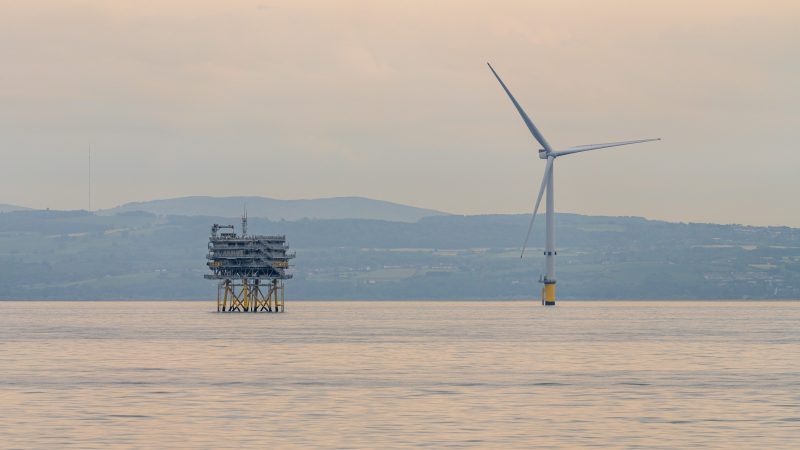As the nation prepares to head to the ballot box, the country has two choices: to vote for a Tory Party whose energy policies have added billions to the nation’s bills, or to vote for a party that understands that the green economy is the biggest opportunity since the industrial revolution and has a vision for the future.
Energy Secretary Claire Coutinho continues to trot out the same tired lines, recently saying: “Labour’s manifesto pledge to shut down our thriving oil and gas sector will destroy jobs, raise taxes, and hike up your bills.” This Conservative rhetoric is nothing new – but it is also fundamentally hypocritical.
Ten years ago, Conservative Prime Minister David Cameron infamously declared he was going to ‘cut the green crap’ as he set out a series of anti-green measures.
These included banning onshore wind, cutting financial support for domestic solar, scrapping home insulation schemes, and removing the Zero Carbon standard for newbuild homes. Cameron argued that green policies were expensive and needed to be reined in. That we could not afford them.
Ten years later, Conservative Prime Minister Rishi Sunak is repeating history – setting out a series of green policy reversals and renewed anti-green rhetoric. At the heart of his argument is the (same) idea that we need to slow down the transition to green energy and net zero to save people money and ease the cost-of-living crisis.
This false narrative, that we cannot afford the green transition – is a cynical populist move to win votes, it twists the facts, paints a false picture of the opportunity renewables offer, and is incredibly harmful to the UK’s net zero ambitions – and our energy bills.
The actual cost of ‘cutting the green crap’
A
new report by the Green Britain Foundation (GBF) lays bare how damaging Cameron’s decision to ‘cut the green crap’ has been for British bill payers. Our data shows that in 2023, the total additional cost to the nation’s energy bills due to Cameron’s policies was a whopping £5 billion.
Over the last ten years, the total additional cost rises to £15 billion. The worst affected homes paid £1,500 more that year for their energy than they would have had Cameron not made those cuts.
Typical energy bills in 2023 were £2,750, meaning the worst-affected households saw their energy bills more than double compared to what they would have been. More than double.
People in new build homes from the last decade typically paid £700 more for their energy than they would have without these dogmatic policies. That’s one third higher than need be.
Our analysis shows very clearly that Cameron’s green policy cuts did not save money, in fact the opposite has been the case – we’ve all paid far more for our energy than we otherwise would have. A further study from the GBF shows that for every pound we spend on renewable energy, we get two and half times more jobs and twice the GDP growth than if we spent that same pound on fossil fuels.
While a
recent report by the Office for Budget Responsibility (OBR) found that our continued reliance on fossil fuels for power and heating could pile hundreds of billions of pounds onto public debt by 2050 – more than double the costs required to phase out gas use and build a net zero economy. Again that doubling of cost.
Energy for the future
The Stone Age didn’t end because the world ran out of stones, but because we found something better. The fossil fuel age is ending now, in the same way – because renewable energy is that something better – a clean energy source that costs vastly less and will never run out.
By harnessing Britain’s ‘forever fuels’ we can break our dependence on fossil fuels and the international energy market that controls their price – the two causes of the energy crisis. We can have permanently low energy bills, eradicate fuel poverty, and create hundreds of thousands of new jobs in the energy sector.
The ‘crap’ that we need to cut is this harmful counterfactual rhetoric – that we can’t afford the transition to green energy. The truth is we can’t afford not to.
We have everything we need to make this transition; the technology, the resources – the economics are on our side, as increasingly are the people – we just need a government that gets it.
READ MORE: Sign up to our must-read daily briefing email on all things Labour
Read more of our 2024 general election coverage:
Labour wants a new generation of new towns. Can it win in Milton Keynes?
2024 manifesto versus 1997: ‘There are big similarities, but big differences’
‘How can I help Labour this election? The party insider’s guide to campaigning’
Revealed: The battlegrounds attracting most activists as 17,000 sign up
SHARE: If you have anything to share that we should be looking into or publishing about this story – or any other topic involving Labour or the election – contact us (strictly anonymously if you wish) at [email protected].
SUBSCRIBE: Sign up to LabourList’s morning email here for the best briefing on everything Labour, every weekday morning.
DONATE: If you value our work, please donate to become one of our supporters here and help sustain and expand our coverage.
PARTNER: If you or your organisation might be interested in partnering with us on sponsored events or content, email [email protected].





More from LabourList
‘The Sherriff of Wild Westminster: what must change in elections bill’
‘The hope that kills you’: Reflections from the final day in Gorton and Denton
MPs, union leaders and organisations react to ‘bruising’ Gorton and Denton result